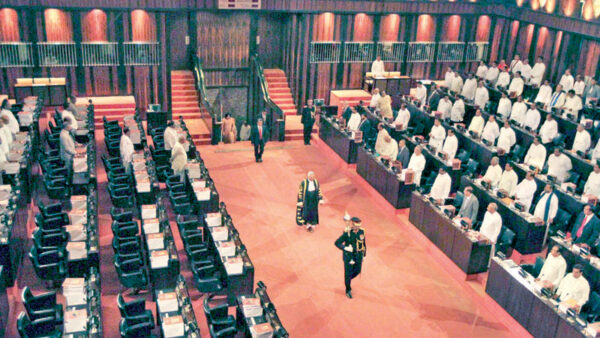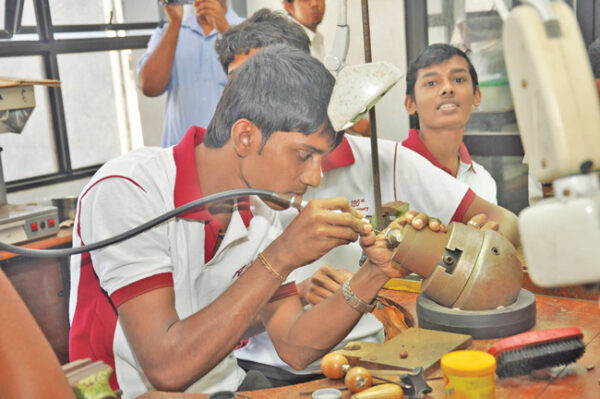The Winning Mindset for Leadership
Making Effective Policy and Strategic Decisions

Lawmakers should put country before party politics.
Source:dailynews.lk
While appreciating all the good work done by all the governments so far, Sri Lanka’s current problem can reasonably be concluded as a decision-making failure both at the policy level and strategic level during the recent past as well as after Independence. Even during this crisis, it is good to note that at least some decisions are taken correctly, but there are doubts about whether some decisions are taken correctly at the policy-making and strategic level of the country. This must have occurred at all levels of policy and strategic decision-making for at least the last three to four decades. If the right policy level and strategic level decisions are not made, the country may suffer more. It is encouraging to see that good work is progressing towards the short-term dollar issue, but it is hard to notice good and solid strategic decisions on the rest of the important areas, like how to increase the dollar income and decrease the dollar expenses in the short to medium run, which is the only way out we have. If this is not handled properly, the crisis may escalate to the point where it is no longer manageable.
First, let’s look at why the right decisions at policy and strategic levels are not made most of the time.
* “Country Second Mindset”: Politicians’ “country second, politics and party first” mentality is one of the major reasons for not making the right decisions. Political agendas, coming to power and earning money are the priorities for some politicians. Policymakers’ and top-level officers’ “country second, me first, profession first” mentalities also play a major negative role. This leads to an undesirable division in parliament as well as among policy-making experts. As a result, there is less motivation to create a national policy and strategic plan for the next two decades.
* A “yes sir” mentality in which officers rarely question the decisions of political power or their own bosses. In a way, this is one of our cultural barriers. This is further topped up by the egoistic nature and arrogance of top-level individuals who discourage and ignore the technical experts in the subject area. Some policymakers and strategic decision-makers have a silo mentality and a narrow-minded approach.
* Not doing the right thing: Failure to concentrate on doing the right thing for various reasons, such as poor decision-making abilities, making emotional decisions by ignoring facts and analysis, influencing individual agendas and lack of appreciation of others points of view. Some of the members of parliament are clueless about the problem and what the solution could be. Mostly, the decisions are not backed up with strong and practical implementation plans. Lack of interest and sense in understanding and prioritizing the critical areas to focus on is also a very crucial issue. Failure to assign responsibility and accountability for decisions, inadequate planning, and lack of proactive behavior also worsen the situation.
Solving this problem immediately is important to help our country move in the right direction. When the speeches in Parliament are analyzed, it can be realized that most of the speeches are emotional and personal, filled with party politics, rather than talking about the facts and figures and giving honest opinions to solve the problem. The very lengthy meetings of senior officers and policymakers without having a focus and plan also bring no results.
In such a context, how to solve this problem immediately to get the best advantage for Sri Lanka? One of the best solutions is to follow a decision-making framework that should be followed in top-level policy making and strategic decision-making at Cabinet, Parliament, and other policy and strategic decision-making levels.
The model proposed by me has four steps.
1. Every Heart and Brain in the Game: An Independent Expert Committee to study and share the facts and figures related to the problem to solve and the decisions to make.
The independent expert committee must be comprised of practical and proven decision-makers who have demonstrated solid results. The independent expert team ideally comprises of senior level corporate sector visionary leadership, multidisciplinary technical experts with local and international experience, and a few young professionals with analytical skills, innovative and creative thinking, and strong technological applications. The young professionals will collect and analyze the data for the senior team to incorporate their wisdom and thinking to arrive at options. The young professionals will be able to present the findings in an attractive and easy-to-understand manner so that the attention of the intellectual members of Parliament can be sought, whilst some of the less intellectual members of the Parliament can also understand the reality.
2. Discuss and Debate With a Purpose: Brainstorm the above findings at the Parliament/Cabinet/policy-making meetings

Vocational training for youth
It is important to brainstorm the above findings at the Parliament/Cabinet/policy-making meetings to answer the big why. What problem is going to be solved? What does it look like when it is solved? The short-term and long-term visualization of solutions are important.
The team’s opinions must be sought in a very structured manner, with no members allowed to speak outside of the topic. The discussion must be rich with facts, dreams, ideas, and problem-solving as opposed to the usual practices of our Parliament or meetings headed by officers. The objective is to conclude with the desired answer and outcome with a very strong why. This will help to get the fullest support of the team when it comes to real implementation.
3. Thinking Big: Consider the big picture, think carefully, and have a solid implementation plan
When decisions are made, it is necessary to think about the big picture of how the decisions are going to affect the other areas, such as the general public, the economy, supply chains, international relations, and overall as a country. Hence, it is very important that a structured checklist is prepared to measure and understand the risks and their impact, as well as the risk mitigation plans. This must incorporate solid implementation, effective communication and a change management plan that understands the ground reality.
4. Learn from High-Performing Private Sector: The Power of People Development and Best Practices
One of the very important reasons behind a very successful private-sector organisation is the performance of its people. This is on top of their best practices such as having clear goals, correct decision making, transparency, strategic planning, having proper systems, effective delegation, prompt communication, accountability, and teamwork. The strategy they have with people is that they recruit the ideal people for the post and they give continuous training and coaching to develop their attitudes, mindset, motivation, leadership, management, and technical skills. Even the best-performing CEOs and entrepreneurs do have personal executive coaches to help them. Even though some of the members of parliament may not be ideal for the position, they also have diverse education and experience. At this critical moment, the members of parliament should be given good training on values, attitudes, and skills such as decision-making and leadership and, of course, team-building to work together as a team to solve the problem rather than spend too much time talking about the problem.
(The writer is an Expert Trainer and Coach on Mindset Mastery, Motivation, Management, Leadership, and Organizational Transformation. He is a Chartered Engineer, a Project Management Professional, and a Senior Lecturer attached to the Faculty of Engineering at the University of Moratuwa)







